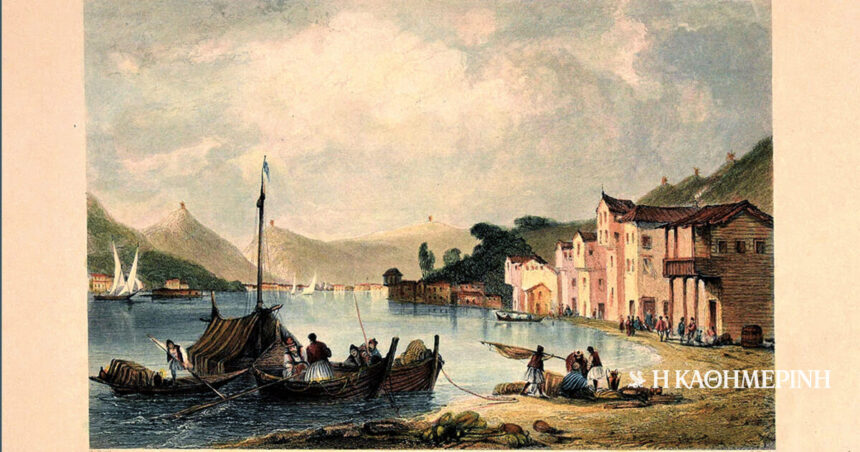At the same time that European newspapers praised the archaeological finds in Ithaca, worldwide known through Homer’s epics and Odysseus’ travels, the islanders were experiencing unprecedented economic boom due to the expansion of their commercial and shipping activities. Already in the 18th century and with greater intensity in the 19th century, Ithaca, taking advantage of its geopolitical circumstances and its rich naval tradition, became an important shipping center, actively participating in the naval and commercial events of the Eastern Mediterranean.
A rising center
In 1815, with the integration of the Ionian Islands into the British protection as “the United States of the Ionian Islands” (the Union of the Ionian Islands with Greece was sealed in 1864), the Ithacans took advantage of their favorable position within the British Imperial System, enhancing their presence in the commercial roads.
The British Colonel and Governor of Kefalonia, Charles James Nipierhe emphasized in his writings the importance of the Ionian Islands for Great Britain. Prior to the opening of the Suez Canal, the central location of the islands in the Mediterranean, such as Ithaca, allowed to control the trade routes to the Red Sea and the Persian Gulf. The strategic location of Ithaca, between the Greek peninsula and the sea streets that connected the West with the East, made it a focal point for the supervision of commercial and maritime activities in the area.
At a time when naval forces competed for the sovereignty of maritime routes, these islands were considered “natural strongholds” for the defense of British interests and Britain’s sovereignty in the Mediterranean, ensuring communication with sea trails and maritime trails.
Ithaca commercial fleet was registered under the separate flag, the flag of the Ionian Islands, which symbolized precisely this particular relationship with the Empire, offering the Ithaca comparative advantage over other Mediterranean seafarers. The fact that they were British nationals allowed them to have the diplomatic protection of the British consular authorities. This offered them more security and facilitating transactions, even in politically unstable areas, creating a security environment for their commercial shipping and business activities, especially in the eastern Mediterranean and the Black Sea.
The grain trade
Since the late 18th century, Thian merchants and shipowners, who were already active in commercial shipping, just like the Kefalonians, utilized the political contexts in the Eastern Mediterranean and the Black Sea, as well as the commercial flow of cereals from the Danube areas, Mediterranean and especially to Italy and Western Europe.
The cereals, one of the main exportable products of the Danube regions of Moldova and Wallachia, were the “backbone” of the Ithaca commercial activities. Many settled in the ports of the Black Sea, and mainly in the ports of the Danube, founded commercial and shipping houses in Galatsi, Braila, Toultsa and Soulina, bought selpia and tugs – Ideal for the transport of bulk Vrigantines, and then with some steamships, carried wheat from the Black Sea to the western Mediterranean.
The economic activity of the island was linked to the Black Sea and the trade of cereals, which allowed the Ithaca to expand their shipping activities in wider geographical areas and to consolidate their presence in 19th -century shipping markets.
The economic importance of this trade was not only limited to the profits from the transfer of cereals, but also expanded to the creation of commercial networks that connected Ithaca to the whole Mediterranean, and mainly with Trieste, Genoa and Marseille. The Ithaca shipowners worked with traders and bankers from these cities, thereby enhancing their economic and cultural relations with the European world.
The flowering of shipping in Ithaca is also reflected in the island’s fleet, numbering 48 seagoing ships (over 50 tonnes) registered in Vathi, its main port.
The families
Ithaca maritime tradition was largely based on strong families of shipowners, who shaped the island’s economic and social structures. Based on both their relatives and their business modernity, families such as those of Vlassopoulou; Dendine; Gram; Dragon; Theophilatou; Statate; Karavia and Fly They played a leading role in the development of maritime trade and the expansion of the Ithaca Navigation Networks. Many families invested in small and medium -sized ships, which they used for local and international trips.
The booming of shipping in Ithaca is also reflected in its fleet, which numbered 48 seagoing ships (over 50 tonnes) registered in Vathi, the main port of the island. Its success in shipping is also evidenced by the investment of some of the island’s shipowners in steamship. The shipowners of Ithaca were one of the first to make the transition from the sail to steamed, starting in 1873, when the Theophilatos family, in co -ownership with the Kefalonian Valianos, built the Sanderland shipyards, one of the first Sanderland Shipyards.
These naval families, which were the elite of the Ithaca society, also played an important role in shaping the island’s social and political structures. Their financial success in shipping and commerce brought wealth to Ithaca, affecting the local community and contributing to the creation of a new form of social hierarchy, where possession of ships and involvement in international trade were important prestigious factors. With the contribution of these shipbuilding families, the island was constantly flourishing.
Ithaca acquired, at the beginning of the 20th century, the School of Merchants, the Stathatos School, which was housed in a building built by Ernesto Ziller in the city center. The island also founded two insurance companies, Odysseus (1858-1878), and “Ithaca” (1863-1872), by Spyros Ferentino and Spyros Vlassopoulos, respectively. In 1924, Ithaca was one of the first islands to be powered in Greece, following the contribution of George Drakoulis to build a power plant in Vathi.
‘Advocated’
As the geologist and academic writes David Entent Following his tours of the Ionian Islands in 1863, “the inhabitants of Ithaca are addicted to maritime occupations. […] Vathi is the main port of the island and the number of ships and boats belonging to it is really great. […] Much of the city’s population deals exclusively with shipping -related issues. This occupation is so intense that in some times for some times one can see a man or boy on the street. “
This description is not far from the reality that the island was experiencing. The maritime profession in Ithaca was not only economic activity, but also a way of life.
The development of commercial networks with the Danube areas and relations with the major European ports have determined the well -being of the island. The wealth of the city was evident from the well -groomed houses that reflected the economic discretion of the residents, as often described by the English and French travelers who stopped on the island for a while. Ithaca maritime tradition continues to be a fundamental element of the identity of the island and its inhabitants.
The links created in the 19th century with the Mediterranean trade networks left a rich cultural and economic heritage, which remains alive to this day. Following the 20th century political and economic circumstances, Ithaca traders and shipowners carried their commercial and shipping houses to Great Britain, and mainly to London, while post -war was directly linked to Aristotle and Aristotle, An excellent example of the relationship of a small island to the sea.
Ithaca Historical Archive
The Department of the General Archives of the State (GAK) in Ithaca houses a treasure treasure of historical documents starting from the Venetian occupation. With great care and knowledge, Mr. Christos Moniremployee of the archive, Mr. Ioanna Peponiseconded teacher, along with the invaluable contribution of Mr. Gifts ZafirauHead of the Department of the General Archives of the State in Kefalonia and if. Head of the Department of Ithaca, they try to rescue and protect the archival material.
The IMS -ITE Maritime History Center, and through his students’ research missions, under the responsibility of the Director of the Institute, Professor Jelly and a doctoral candidate Minas Antipascontributes to the recording and classification of the excellent historical material.
*Dr. Kalliopi Vassilakis is a postdoctoral researcher at the Center for Maritime History / Institute of Mediterranean Studies – FORTH.
** The Maritime History Center
of the Mediterranean Institute
Study – ITE (www.ims.forth.gr)
and ‘Kathimerini’ present
unknown aspects of the course
of the Greeks in the ‘sea
Business’, from the 19th century
to this day.




